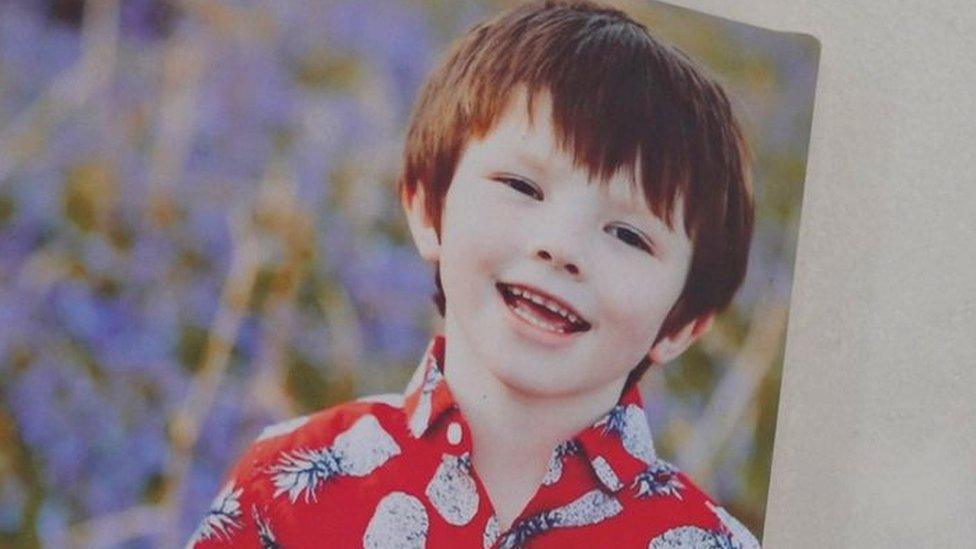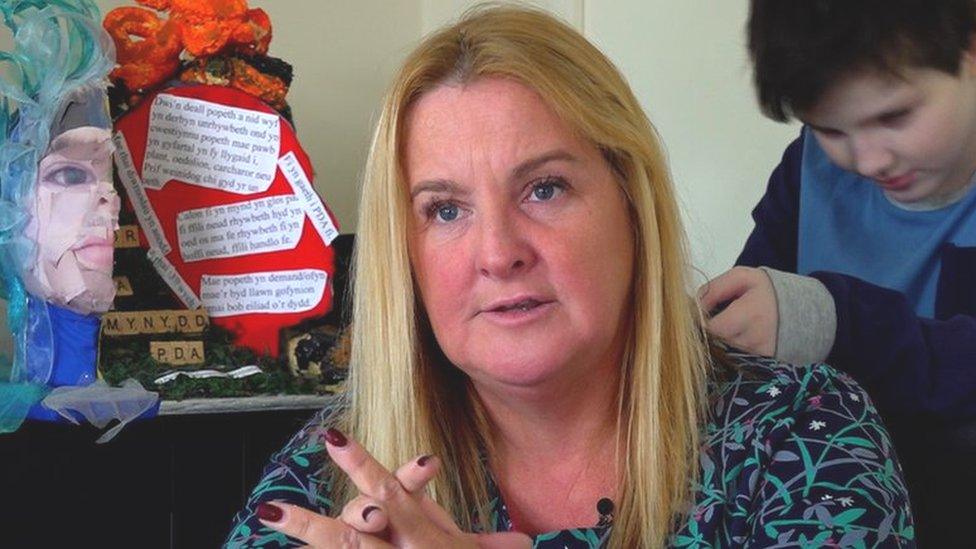PDA: Mother says primary schooling failed autistic son
- Published

The Reverend Angharad Griffith feels Llewelyn was let down by his primary schooling experience
A mother who says her son's disorder "imprisons" him claims he was failed by education at primary school level.
Llewelyn has a profile on the autism spectrum whose main characteristic is to avoid everyday demands and expectations to an extreme extent.
The Reverend Angharad Griffith believes primary schooling does not help pupils with pathological demand avoidance (PDA) transition to secondary level.
Carmarthenshire council said it does its best to meet every learner's needs.
"What we live with each day is the fact that children with PDA see everything as a demand, or a command, even the expectation to say 'hello'," said Ms Griffith, who is working to raise awareness.
According to the PDA Society, research into it and its effects are still at an early stage. It is estimated that one in five people with autism may have a PDA profile.

"The system failed Llew at the end of his time at primary school and so that's had a knock-on effect on everything else," says his mother
Llew has failed to go to school regularly for a number of years, and his mother feels that the system at primary level is partly to account for this.
"It failed. The system failed Llew at the end of his time at primary school and so that's had a knock-on effect on everything else," she said.
"I don't think that the primary system as it is at the moment is doing enough for PDA children, and you must have the primary system in place or they can't transition into secondary. You must get it right."
According to the PDA Society, someone with a PDA profile shares autistic characteristics.
Their characteristics also include a need for control which is often anxiety related; avoiding everyday demands and expectations, including things that they want to do or enjoy, to an extreme extent; and tend not to respond to conventional parenting, teaching or support approaches.
'A Lamborghini with no brakes'
The PDA Society said it "supports families across Wales who are experiencing these challenges and believes more awareness and understanding of the needs of PDA children is needed within the education system to tackle this".
In an attempt to describe how his brain works, underlining also how advanced his mind seems to be on a creative and aesthetic level, Llew often crafts artistic pieces.
One example under the title Sea and Mountain shows how a model of a volcano and a tsunami depicts the state of his mind.

Llew expresses his feelings in Welsh through his art
"My brain is like a racing car," said Llew. "A Lamborghini with no brakes."
He said: "PDA controls my mind. It doesn't allow me to do the things I want to do, like go to school, go outside, mix with other people.
"If anxiety was a person, I'd slap it across the face really hard. I hate it."
Llew and his mother have a good relationship with the secondary school with which they are now affiliated.
She said there is an attempt to provide support and a level of education.
"It's a sad situation because we want the best and I hope that the education system wants the best for our children, but it just hasn't happened in this case [in the primary sector," said Ms Griffith.
'Solid procedures'
"And this child is now held prisoner by his own mind, and he's imprisoned in his community. And that community is very, very small - it's just his home."
Glynog Davies, Carmarthenshire cabinet member for education and the Welsh language, and director of education Gareth Morgans, are planning to meet Ms Griffith and other parents to listen to their concerns.
Mr Davies said: "There are solid procedures in place with regards to inclusivity and, as a council, we do our best to meet the needs of all learners."
The Welsh government said it was undertaking a neurodivergence improvement programme, external backed by £12m.
"And we have established a neurodivergence clinical advisory group from which members can provide expert advice on the recognition of pathological demand avoidance in Wales," it said.
Related topics
- Published5 March 2022

- Published13 March 2023
